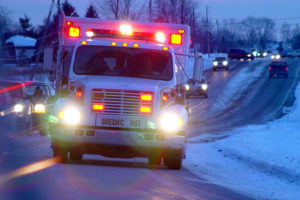Failure to Yield to Emergency Vehicle in Virginia
May 12, 2016 by Jean Humbrecht
All drivers know that they must move over if an emergency vehicle is approaching with its lights and siren on. Failure to move over, or failure to yield the right-of-way to an emergency vehicle, is actually a traffic infraction. Failure to Yield to Emergency Vehicle in Virginia is charged under Va. Code §46.2-829.
What Must A Driver Do When An Emergency Vehicle is Approaching?


Failure to Yield to Emergency Vehicle in Virginia Under Va. Code 46.2-829 is Punished with a Fine up to $250
Virginia drivers are required to move out of the way when an emergency vehicle with flashing lights and an audible siren is approaching. Specifically, drivers must:
- drive to the edge of the roadway
- clear of any intersection of highways
- as quickly as traffic and highway conditions permit
- stop and remain there (unless otherwise directed by a law enforcement officer)
- until the emergency vehicle has passed
If a driver fails to move over for a moving emergency vehicle, he has committed the traffic infraction of Failure to Yield to Emergency Vehicle in Virginia under Va. Code §46.2-829.
If the driver also overtakes and passes a moving emergency vehicle with it’s lights and siren on, the offense is charged as reckless driving, which is a crime in Virginia. This offense is criminalized in the same statute making failure to yield to moving emergency vehicles a traffic infraction. For more information on Overtaking and Passing an Emergency Vehicle in Virginia, click here.
Penalty for Failure to Yield to Emergency Vehicle in Virginia
A driver convicted of Failure to Yield to Emergency Vehicle in Virginia faces a fine up to $250 and 4 DMV demerit points.
A driver can pre-pay a ticket for Failure to Yield to Emergency Vehicle in Virginia and avoid coming to court. However, pre-paying the ticket is an admission of guilt and will result in a conviction on the offender’s driving record and DMV points.
Failure to Yield to Emergency Vehicle in Virginia: Statute
§46.2-829. Approach of law-enforcement or fire-fighting vehicles, rescue vehicles, or ambulances; violation as failure to yield right-of-way.
Upon the approach of any emergency vehicle as defined in §46.2-920 giving audible signal by siren, exhaust whistle, or air horn designed to give automatically intermittent signals, and displaying a flashing, blinking, or alternating emergency light or lights as provided in §§46.2-1022 through 46.2-1024, the driver of every other vehicle shall, as quickly as traffic and other highway conditions permit, drive to the nearest edge of the roadway, clear of any intersection of highways, and stop and remain there, unless otherwise directed by a law-enforcement officer, until the emergency vehicle has passed. This provision shall not relieve the driver of any such vehicle to which the right-of-way is to be yielded of the duty to drive with due regard for the safety of all persons using the highway, nor shall it protect the driver of any such vehicle from the consequences of an arbitrary exercise of such right-of-way.
Violation of this section shall constitute failure to yield the right-of-way; however, any violation of this section that involves overtaking or passing a moving emergency vehicle giving an audible signal and displaying activated warning lights as provided for in this section shall constitute reckless driving, punishable as provided in §46.2-868.
***DISCLAIMER: THE MATERIAL AND INFORMATION CONTAINED IN THIS POST, ON ANY PAGES ON THIS WEBSITE, AND ON ANY PAGES LINKED FROM THESE PAGES, ARE FOR GENERAL INFORMATION ONLY AND NOT LEGAL ADVICE. YOU SHOULD CONSULT A LICENSED ATTORNEY IN YOUR JURISDICTION BEFORE RELYING ON ANY OF THE INFORMATION CONTAINED ON THESE PAGES. SENDING EMAIL TO OR VIEWING INFORMATION FROM THIS WEBSITE DOES NOT CREATE AN ATTORNEY-CLIENT RELATIONSHIP***





